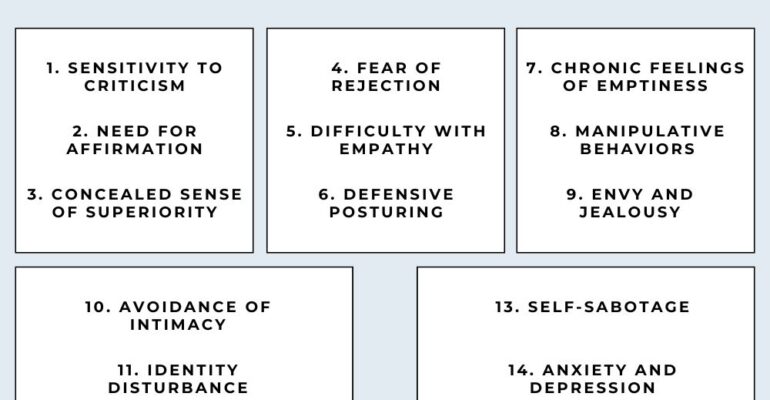What Is A Vulnerable Narcissist? 15 Vulnerable Narcissist Traits
Understanding the vulnerable narcissist is crucial, as common perceptions often mislead us. When picturing a narcissist, images of unshakable confidence and emotional resilience may spring to mind.
Yet, beneath the surface, whether we’re discussing a covert narcissist or a malignant malicious narcissist, lies a core vulnerability. It’s a misconception that all narcissists are overt in their self-centeredness. In reality, many harbor deep-seated insecurities.
Spotting a vulnerable narcissist isn’t straightforward without knowing the specific behaviors, traits, and red flags to look for.
This topic hits close to home for many, myself included, as countless individuals fall prey to their subtle manipulations. In fact most of us, especially if you’re an empath, you might even end up feeling sorry for the narcissist and want to protect them.
Through this article, I aim to shine a light on this pressing mental health issue. I’ll delve into 15 vulnerable narcissist traits, peel back the layers to reveal what lies beneath their facade, and explore the fragility of their egos. By understanding whether narcissists harbor low self-esteem and how they navigate relationships, we can better arm ourselves against their manipulative tactics!
If you’re struggling to heal from narcissistic abuse, I warmly welcome you to my Narcissistic Abuse Recovery Program. It’s an easy self-paced online course which you can do at your own pace. My signature program combines scientific and spiritual tools for holistic healing of the body, mind, and spirit.
15 Core Traits of a Vulnerable Narcissist
With over 60 million people in the US being negatively impacted by other people’s pathologies like narcissistic personality disorder, familiarizing ourselves with vulnerable narcissist signs is crucial.
Here are 15 core traits that define vulnerable narcissism:
1. Sensitivity to Criticism
A vulnerable narcissist overreacts to constructive feedback, perceiving it as a personal attack. For example, a simple suggestion for improvement at work could lead to an emotional outburst or silent treatment, highlighting their hypersensitive narcissism.
2. Need for Affirmation
Those with vulnerable narcissist traits tend to seek endless praise to validate their self-worth. They constantly fish for compliments about their new outfit or work achievement, never truly satisfied with the acknowledgment they receive.
3. Concealed Sense of Superiority
A sense of superiority and entitlement is one of the 12 traits of a narcissist. Despite their outward insecurity, vulnerable narcissists harbor a hidden belief in their own uniqueness and superiority. This might manifest in dismissive behavior towards others’ opinions or achievements, subtly implying that they alone have the ‘right’ perspective or talent.
4. Fear of Rejection
Insecure narcissists may go to great lengths to avoid rejection, often interpreting neutral actions as personal slights. For instance, a friend canceling plans last minute might be seen as a profound betrayal, not a simple change of schedule.
5. Difficulty with Empathy
Individuals with vulnerable narcissist personality disorder often find it hard to genuinely connect with the emotions of others. For example, they might shift a conversation from a friend’s difficulties to their own issues, showing a lack of true empathetic engagement.
Research indicates that narcissistic traits have surged by 30% in Western cultures over the last three decades, correlating with an uptick in antisocial behaviors and public concern. Especially in those with grandiose narcissism (a major narcissist redflag), there’s a noticeable lack of empathy, often manifesting as outright rejection or criticism of others.
This lack of empathy can sometimes drive competitive or self-serving behaviors, particularly in leadership roles, where it may lead to unethical or exploitative actions for personal advantage.
Related: Do Narcissists Feel Guilt?
6. Defensive Posturing
Defensive behavior is a hallmark of the insecure narcissist, who often feels threatened by differing views or criticism. This could look like someone immediately jumping to justify their actions or decisions, even when no real challenge was presented, always ready to defend their fragile ego.
7. Chronic Feelings of Emptiness
Vulnerable narcissists often experience a pervasive sense of hollowness, despite their accomplishments or social status. This could manifest in someone constantly seeking new experiences or achievements, yet never feeling fulfilled, a classic sign of fragile narcissism.
8. Manipulative Behaviors
Manipulation and narcissist gaslighting is a common strategy among vulnerable narcissists, used to sway situations in their favor. They typically twist words or play emotional games to ensure they’re always seen in a positive light or to get their way.
9. Envy and Jealousy
Envy and jealousy are intense among vulnerable narcissists, who often find it hard to celebrate others’ successes. They usually belittle friends’ achievements or feel bitter when others receive attention, showcasing the deep-seated insecurity that drives vulnerable narcissists.
10. Avoidance of Intimacy
Vulnerable narcissists often shy away from close relationships, fearing true intimacy could expose their weaknesses. This might appear as someone who keeps partners at arm’s length, sabotaging deeper connections, a telltale vulnerable narcissist sign indicative of a narcissist with low self-esteem.
11. Identity Disturbance
Those facing vulnerable narcissism may exhibit a shaky sense of self, constantly questioning their identity and values. They become fully identified with a constructed persona, a mask that conceals their true selves, as a defense mechanism.
This facade is maintained with great effort, as their fragile ego cannot withstand the acknowledgment of personal flaws or imperfections. This constant identity shifting and mask-wearing are clear signs of the deep-seated identity disturbance that plagues vulnerable narcissists.
Related: Do Narcissists Know They Are Narcissists?
12. Passive-Aggressiveness
Passive-aggressive behavior is a hallmark of vulnerable narcissists, used as a covert way to express anger or discontent. An example is giving a backhanded compliment or ‘forgetting’ important dates as a means of punishment, showcasing one of the more insidious vulnerable narcissist signs.
13. Self-Sabotage
Vulnerable narcissists may at times undermine their own success, perhaps subconsciously, as a manifestation of their inner turmoil. This self-defeating behavior might be seen in someone who, despite being capable, procrastinates on important tasks or withdraws from promising opportunities, unknowingly acting against their own best interests.
14. Anxiety and Depression
The inner world of a vulnerable narcissist can be fraught with anxiety and depression, stemming from their deep-seated insecurities and constant need for validation. This can manifest as periods of intense sadness or worry, particularly after moments of perceived failure or rejection, further complicating their emotional state of being.
15. Projecting Blame
A common defense mechanism for vulnerable narcissists is to deflect responsibility and project blame onto others. Instead of acknowledging their own shortcomings, they accuse colleagues of hindering their success or blame partners for relationship issues, avoiding any introspection that might reveal their vulnerabilities.
Related: Things Covert Narcissists Say
What is Vulnerable Narcissism?
Vulnerable narcissism is a mix of sensitivity and a fragile inflated ego. It’s marked by a fear of criticism and a hidden superiority complex (two qualities on the narcissist checklist). But, this vulnerability doesn’t excuse any abusive actions that might come from these individuals.
Narcissists and empaths often find themselves in long, complex relationships. Empaths may feel drawn to the narcissist’s hidden pain, hoping to help. This can lead to unhealthy dynamics, where the empath sacrifices their own well-being.
It’s important to see that “vulnerable” doesn’t mean harmless. It points to the internal issues driving the narcissist’s behavior. Understanding this helps in making informed choices about these relationships, ensuring personal health and happiness.
Beyond the Traits: The Vulnerable Narcissist in Relationships
Vulnerable narcissists in relationships can create complex dynamics. Their traits often lead to challenges in both personal and professional settings.
In romantic relationships, their need for affirmation may strain you as their partner. They might demand constant attention, leaving little room for mutual support. In addition, their sensitivity to criticism can turn small disagreements into major conflicts.
At work, their fear of rejection might hinder teamwork. They could resist feedback, slowing down project progress. Their passive-aggressiveness can create a tense environment, affecting team morale.
Understanding these patterns is key to navigating relationships with vulnerable narcissists. It’s about finding a balance between empathy and maintaining personal boundaries.
Related: Setting Boundaries with a Narcissist
Exploring the Causes of Vulnerable Narcissism
Vulnerable narcissism often stems from complex origins, including traumatic childhood experiences. Those labeled as narcissists with low self-esteem or showing signs of insecure narcissism might have faced neglect or inconsistent validation in their early years. Such backgrounds can lead to a deep-seated sense of inadequacy and low self-worth.
It’s crucial to differentiate between self-esteem and self-worth. Narcissists might exhibit high self-esteem, reflected in an outward display of confidence. Yet, their self-worth, the intrinsic value they place on themselves, can be remarkably low. This discrepancy lies at the heart of vulnerable narcissism.
High self-esteem can mask the internal void of low self-worth. Narcissists may seek external validation to compensate. Understanding this can shed light on their behaviors, offering insights into their inner struggles.
Coping and Dealing with Vulnerable Narcissists
Interacting with vulnerable narcissists can be challenging and complex It’s important to develop effective strategies to protect your emotional and psychological well-being.
Here are some strategies to help:
- Set Clear Boundaries: Define what behaviors you find acceptable and consistently enforce them. Setting boundaries isn’t about controlling others, but managing your reactions and how you engage with their behavior. For example, if they resort to name-calling or belittlement, choose not to engage further rather than attempting to change their behavior.
- Practice Self-Care: Prioritize activities that boost your mental and physical health. Whether it’s a hobby, exercise, or meditation, these acts of self-care are your shield against the draining effects of dealing with a narcissist.
- Seek Support: Surround yourself with people who understand and uplift you. Joining a support group or simply having a friend to vent to can be immensely relieving.
- Stay Educated: Learn about narcissism and its impact on relationships. Knowledge is power. Understanding the condition can help you navigate interactions more skillfully. It’s akin to reading a map before a journey; you’ll know what to expect and how to proceed.
- Consider Professional Help: If the situation feels overwhelming, speaking to a therapist can provide new coping mechanisms and perspectives.
Final Thoughts
Navigating relationships with vulnerable narcissists requires patience, understanding, and self-awareness. It’s a journey that demands careful consideration of one’s own boundaries and well-being.
Let’s do a quick recap of the key elements that we explored in this article:
- Vulnerable narcissists exhibit a mix of insecurity and egotism, often hidden beneath a sensitive fake persona.
- Their behavior in relationships can be challenging, marked by a need for affirmation and a fear of intimacy.
- The origins of vulnerable narcissism often trace back to early life experiences, affecting self-esteem and self-worth.
- Coping strategies include setting clear boundaries, practicing self-care, and seeking professional advice when needed.
- Remember, empathy towards a narcissist’s struggles is important, but it should not come at the expense of your own well-being.
If you’re curious about how to break free from the cycle of narcissistic abuse and rebuild your sense of self, my Narcissistic Abuse Recovery Program is here to guide you. Embark on a journey of healing and empowerment and discover the tools and support you need to thrive in your life.
FAQs on the Vulnerable Narcissist
Vulnerable narcissism is a mental health condition marked by sensitivity, insecurity, and a covert sense of superiority, hidden beneath a facade of vulnerability.
Narcissists may project high self-esteem but often suffer from low self-worth, struggling with their intrinsic value and self-perception.
Characteristics include sensitivity to criticism, a need for affirmation, difficulty with empathy, and fear of rejection, among others.
Addressing vulnerable narcissism involves recognizing the traits and seeking professional therapy to work through the underlying issues.
Yes, but it’s crucial to prioritize self-love and protect your well-being while navigating the complex dynamics of such a relationship.
Yes, vulnerable narcissists can be manipulative, often using subtle tactics to sway situations in their favor while masking their insecurities.







